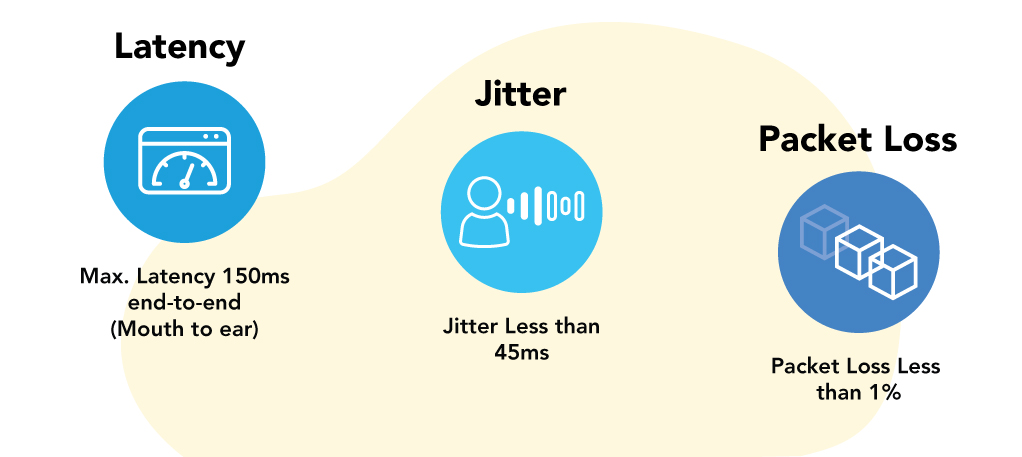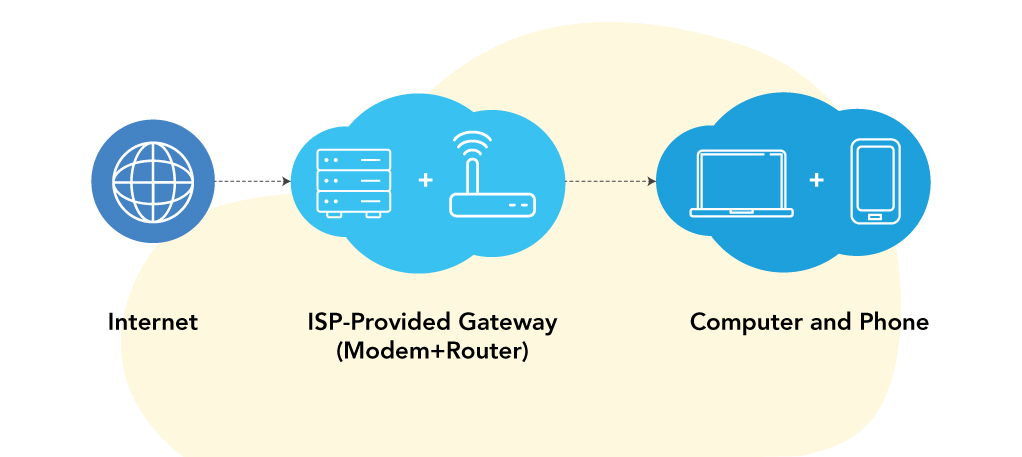Defeating 5 Common Cloud Telephony Problems (with Solutions)
Published On: 9 August 2021

Contents [hide]
Explore this content with AI:
With the increasing use of Internet-based telephony, many businesses are looking forward to integrating their communication processes with cloud telephony-based business phone systems.
Certain features and services have essentially made cloud telephony an emerging player in mainlining business communications worldwide.
But as it stands, like any product it has some bugs and issues to work out. Luckily, there are some effective ways to get rid of those problems and ensure flawless phone services.

Here are some of the most common cloud telephony phone issues companies face:
1. Poor Voice Quality in Cloud Telephony
It runs on the Internet connection that you use in your office. Therefore, voice quality is directly influenced by the quality of internet connection.
Jitters, Latency, & Packet Loss
First, to understand what is Jitters, let know what are data packets?
VoIP sends information through the internet in the form of small packets of data. Packets are sent in intervals to keep a steady flow to the conversation.
Since your voice data is divided and separated into individual packets, the information is not necessarily sent in the same order as it was spoken.
Possibly, certain packets reached the recipient quicker than other packets, due to network interference or congestion. Since VoIP relies on your internet connection, if the connection is poor, it can lead to what is known as jitter, or even packet loss.
Packet Loss
Packet loss is when packets fail to reach the opposite end of any network communication. This leads to missing data, in a VoIP call it leads to missing pieces of the conversation.
Packet loss occurs generally due to network congestion. The network drops, or loses this data due to a number of issues. Where that congestion comes from differs from one situation to the other.
If packet loss reaches a steady, significant level of 5% to 10% packet loss, users notice that the entire sentences go missing. You may find awkward pauses in the middle of a conversation.
Latency
Latency simply means the ‘lag’. It is the time gap between the instruction given for the task and the point when it takes for that task to occur.
Basically, it is the time it takes for the VoIP solution to actually process and convert the voice information into data packets
When you use good quality broadband to cater to your cloud telephony systems, your calls do not suffer from delays, choppy sound or jitters. Unfortunately, many businesses understand this after shifting to cloud telephony which results in complaints and confusion.
There are a few facets that cause these quality issues:
Inadequate Router for Cloud Telephony
One of the most common causes of problems in cloud business phone systems is Call Quality.
Many businesses have a regular router installed at their premises. Improper routers do not prioritize calls through the Internet. Without a router that is configured for cloud telephony prioritization, call quality will be impacted by the other Internet users.
For example, if another user streams or downloads a file while another user is on call, then the call quality would be degraded due to slower Internet.
Improperly configured Internal Network
Many subscribers do not give heed to the requirements of cloud telephony. If a company chooses to run both cloud telephony and its data needs, then they’ll have to configure the internal network to give priority to the cloud telephony.
This problem is easily solved by giving priority to the cloud telephony system connection. The user can also choose to use two different connections to manage their needs.
Poor Internet Connection
Probably the most common reason for poor call quality is a bad internet connection. Poor Internet connections that cannot handle cloud telephony systems are often present in businesses. This results in poor quality call with jitters, delays, and choppy voice. Users often blame cloud telephony systems or vendors for this. But, the main reason for this is not choosing a high-quality connection or broadband.
The first thing a user needs to guarantee in order to ensure decent call quality is adequate bandwidth. Transporting voice packets requires a better connection than the usual web surfing.
This issue can be easily handled by using a proper Internet connection for your Voice processes.
2. Security issues in cloud telephony
Since cloud telephony is connected to the Internet, it is susceptible to malicious attackers and other threats. Security is one of those phone issues that is often overlooked.
To provide security to keep your data safe, necessary security measures should be provided by the vendor himself.
Some of the key methods to ensure security measures to safe-keep your data are –
Passwords
Cloud telephony calls are susceptible to third parties from eavesdropping on your calls. To prevent this, you can use encryptions and passwords.
Strong passwords and setting up encryptions would repel attackers and keep your data and conversations safe.
Security layers and Firewalls
The admin can deploy a firewall specially designed for cloud telephony systems. The firewall would limit the type of traffic and close the session once the call concludes. Different types of firewalls can also help map unusual patterns and identify signs of attack.
Strict security measures at the user end
The user should guarantee the use of strong passwords and limited access.
Assigning each user an appropriate level of access based on their needs protects any confidential data.
Users can also instruct their staff to look out for strange activities within the system.
3. Emergency Calls
Cloud telephony calls are not connected to the static network of telephone lines and a physical network. This feature isolates it from the Emergency services provided by the government or the community.
There is an absence of Emergency service provision, like the 911, which creates a major hassle in the use of cloud telephony. Furthermore, since it doesn’t have a physical address, Emergency agencies cannot ascertain your location.
Nowadays, many major companies are taking an initiative to provide inclusive VoIP telephony services. This can help maintain user confidence too.
4. Cloud telephony needs Power
Since it requires an Internet connection to run, the loss of the Internet will lead to the loss of the phone line as well.
Internet services are susceptible to technical glitches like any other service. No Internet will lead to loss of calls and ultimately to the loss of customers and revenue.
Apart from that, the use of electricity to run the routers and other cloud telephony hardware can lead to some problems as well. If there is a power interruption, then you won’t be able to use your phone services.
The problems of connection or electricity loss can affect your phone system and hence result in the loss of voice processes.
5. Faxing can be Tough
Even in the digital age, there are many businesses using Fax machines to send and receive data. But Fax machines are not compatible with cloud telephony. This might lead to some problems for some businesses as many use Fax as a reliable means of communication.
Although Faxing isn’t completely impossible, you will not be able to just plug your fax machine to cloud telephony. The user will most likely need to install more components to run a Fax machine with cloud telephony. The provider can also check to see whether the cloud telephony system supports a Fax machine.
There might be a few other issues that you might face with your use, although, most of them can be attributed to unfamiliarity with the new phone system. It is important to note that cloud telephony requires proper functioning equipment and adequate bandwidth to perform well. With efficient services, you can leverage cloud telephony and provide seamless phone services to your customers.
Defeating VoIP Issues with JustCall Cloud Telephony
Let’s see how we can find out solutions to the common VoIP problems.
1. Missing Call Analytics?
People using hard phones (SIP devices) want to quickly switch over to cloud telephony. A very prominent reason behind the swift shift is that any SIP provider cannot provide call analytics and call reports.
This makes it really difficult for managers to keep track of team performances and call center or contact center performances on whole.
It is impossible to back up the call analytics on the calling platform. So, a clod telephony solution like JustCall comes to the rescue. It easily integrates with the SIP devices as well.
2. Inbound Call Notifications
major problems in cloud telephony is the voice quality & inbound calls notifications. For inbound call notifications on the system/platform the user uses should be active or online to receive calls.
3. More Productive Agents
With a cloud based phone system that runs on the internet connection, you can now keep trace of your team’s performance.
Analytics like no of working hours, no of calls attended, no. of inbound and outbound calls made have given rise to more productive agents, and hence teams. Superior features like Call Routing now keep an even load of calls on all agents.
4. SMS-Enabled Numbers
To run a successful business, calling is not sufficient. SMS apart from calling is the best channel for communication. And what can be more benefitting than having call plus SMS-enabled numbers.
Throw out your offers. Break all barriers that stop you from reaching out to your distant clients and customers.
Get your SMS-enabled numbers now!
What’s Acceptable?
Given below is a chart showing you the acceptable values of jitter, latency and packet loss. Figures crossing the mentiined limit will lead to poor voice call quality.

How to Improve the Situation?
Updated hardware
Spend a little time and money upgrading the hardware that makes up your internet connection and network. Cables that are thin and poorly insulated will have a noticeable impact on audio clarity.
Try investing in headsets that have short cables with good amount of insulation.
Also, If you’re using the same router for data and voice calls, then it has to be a powerful router that can handle those demands.
Sufficient bandwidth
The internet connection is the main factor that affects the quality of voice calls through VoIP. You will inevitably run into issues if your connection is slow and bandwidth is congested.
To win a high quality voice call, you need unlimited and constant bandwidth. Without sufficient bandwidth, you will not be able to achieve the upload/download speeds.
So, not to threaten the speed of work and productivity, get sufficient bandwidth.
Best-Fit Router
A router can be seen almost as the brain of your internal network, connecting together the other components to create a complete circuit.
Your modem brings in internet from an external source (like cable or fiber optics connections). The modem connects directly to the router, which then distributes that connectivity to other devices.

Configure QoS Plus Other Settings
Routers can also have a Quality of Service(QoS) setting you would want to take advantage of, enabling users to prioritize VoIP traffic over other data.
Prioritizing voice traffic boosts the reliability and clarity of your phone calls. No matter what VoIP phone service you use, you should implement QoS.
Solution: Features required to overcome VoIP Issues (that we built here at JustCall)
Our cloud phone system software is used by tens of thousands of sales and support teams around the world. And, for the above-mentioned reasons, some of them were facing issues at times so we decided to sit down, brainstorm and figure out way-outs to fix these issues or find out ways to by-pass these issues.
So, we built a number of interesting features that help teams with poor internet or IP restrictions due to strong firewalls. A few features are mentioned here:
- Option to connect your SIP device (desk phone with internet connectivity like Grandstream). You can make calls using SIP device while overcoming some of the issues related to browser or system problems.
- Click To Device (Mobile) Calling was built to allow you to make calls from your cellular network while getting all your calls tracked and logged like any VoIP call. This saves you from choppy call quality whenever your agents are in the field or you are having issues with your internet connection.
- Forward incoming calls to your cellular network. Just like point 2, you can forward incoming calls to your cellular network and make calls without an issue while getting all these calls recorded, tracked and logged.
- We also built a smart data-center router to automatically route calls from the nearest data center to your location or via specially designed routes for poor internet connections.
Switch Over to Cloud Phone System Today!
So, if you are planning to switch your current VoIP provider or Cloud Phone System software – schedule a free demo with one of our product experts to learn more about JustCall.
Further reading:
How can VoIP benefit SMBs with big growth plan?
Top 10 Business Benefits of Cloud Telephony
Predictive Dialer vs Auto Dialer: Which is right for your business?



